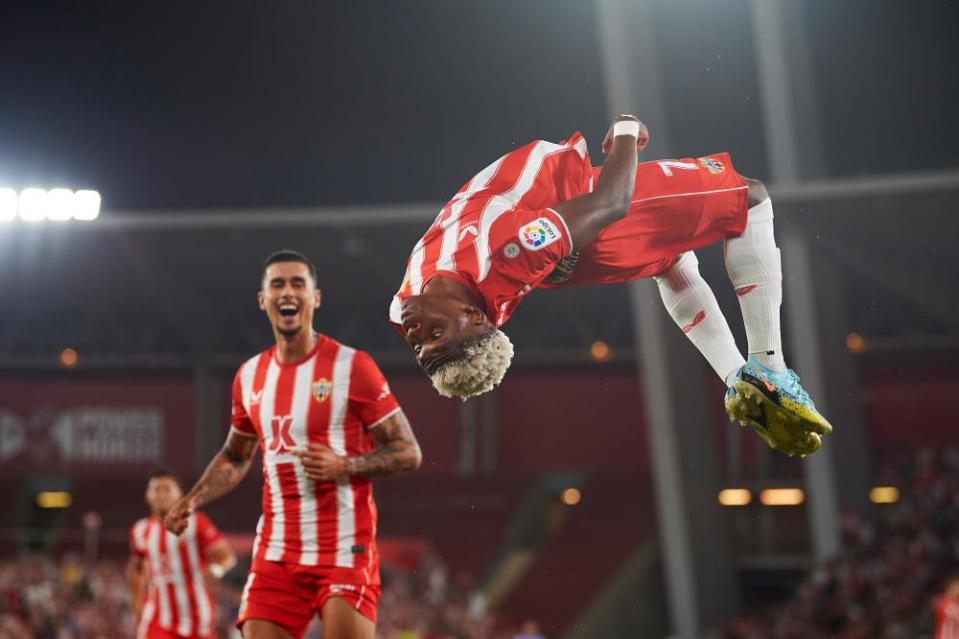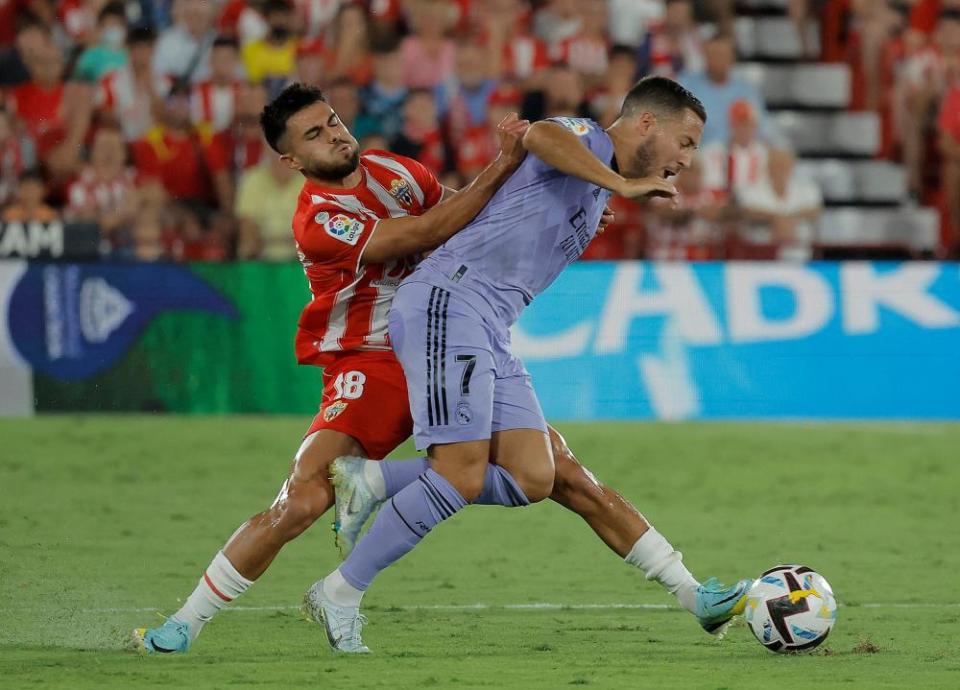For Almería, even the almighty cannot hold Real Madrid off forever
For an hour, the 15,238 Almería fans in the Horse Power stadium might have wondered if the almighty was on their side after all. The man who had begun the night floodlit out on the field, collecting the final few shares he didn’t already own from the founder of the club, certainly did. Or so it goes. Almería had returned to primera for the first time since 2015, faced Real Madrid in their opening game, and proprietor and president Turki Al-Sheikh, the minister in charge of entertainment at the Saudi royal court, didn’t have much faith. Not in his footballers, at least. “I fear we’ll be beaten by a big score,” he said. “I ask the players to draw. If we win, it will be thanks to God.”
Which is one way to describe Largie Ramazani. Because now, five days later, Al-Sheikh was sitting alongside Florentino Pérez in a plush sofa a little out of place in a football stadium and watching the impossible happen below, like some act of divine intervention. Ramazani had scored and was flying through the air upside down, Almería were actually winning and the place was going wild, the scaffolding from the temporary stands rumbling under feet, the woman behind the goal hammering away at the cymbal she had brought, drumsticks crashing into copper.

After seven years away from the first division, it took less than seven minutes for Almería to score there, earlier than anyone had done against Madrid in 15 years. Íñigo Eguaras’ glorious pass, first time with the outside of his boot, tspun into Ramazani, racing through with, a single thought in his mind: “Do. Not. Miss.” When his shot hit the net, the former Manchester United youth player leapt into a spectacular somersault, the fans chanting “Yes, we can!”, and if not many truly thought they could, not then, 53 more minutes had gone and Almería were still leading.
There had been a reaction to resist, goalkeeper and DIY enthusiast Fernando Martínez making three hugely impressive saves and Madrid racking up 12 corners and 17 shots in the first half, seeing a goal disallowed for offside too – but the storm had abated a little. And Almería were still winning, a cup tie energy about it all. A team with four unknown teenagers for summer signings, their best player about to leave and six still not registered, blocked by that salary limit – whose starting XI contained only three men who had played in Spain’s top flight before, and two of those had three games between them – were only beating the European champions.
Were. Just after an hour, Lucas Vázquez got Madrid’s equaliser and then 14 minutes after that, substitute Luka Modric, who changed the match the moment he walked into it, got a free-kick on the edge of the area that really did. On the touchline, David Alaba was preparing to come on and seeing the position, Davide Ancelotti decided to bring the change forward a bit. “We have Alaba here,” he told his dad; “Take the free-kick”, he told Alaba. The Austrian went straight on and, with his first touch, curled an absurd shot into the corner to win it 2-1. “The second is a golazo,” Almería coach Rubi said. “You have to congratulate him. All you can do is applaud. I leave here sad, because we were close to being able to get something. We have taken the best team in the world to the edge.”
HIGHLIGHTS: #AlmeriaRealMadrid 1-2
🤍 Goals from @Lucasvazquez91 and @David_Alaba see @realmadriden come from behind in Almería!#LaLigaSantander #KickOffLaLigaSantander #LaLigaHighlights pic.twitter.com/KE5myDl6Rp— LaLiga English (@LaLigaEN) August 14, 2022
It was significant enough that Almería met them at all, though that alone will not satisfy. This is a club without a big top-flight history, various versions existing before a full start-up in 1971 as Agrupacion Deportiva Almería, which then disappeared in 1982. Re-founded in its current guise in 1989 and beginning in the local leagues, they reached the first division for the first time in 2007, as UD Almería and with Unai Emery as coach. A relegation and a promotion followed before they went down again in 2015 and almost dropped into Spain’s theoretically amateur, regionalised, third-to-seventh tier from where teams tend not to come back – they were 18th in 2016, 15th in 2017 and 18th in 2018. The following year, they were bought out by Al-Sheikh for €20m.
Related: Barcelona’s race against time amid desperate grasp at short-term levers
Al-Sheikh is a renaissance man of many talents who has written some of the greatest musical successes in the Arab world, and counts among the five most important poets there are. That’s what his general director Mohammed el-Assy claimed in an extraordinary interview with El Pais, anyway. “In two or three years’ time he wants people to say: ‘Oh, that man from Saudi Arabia is very intelligent. He came here, started with nothing and made everything valuable. He’s not an idiot who comes to waste money,” El-Assy insisted. The former minister of sport, chairman of entertainment authority, advisor to the crown and president of the Arabic football federation, he has a fortune of €2,100m. While he insists that he is not a state but an individual buyer trying to build up a small club, La Liga has doubts, blocking potential sponsorship deals it considered questionable. Still, some estimates put the amount invested in the club at €65m.
It’s not exactly orthodox. They still don’t have mugs in the club shop, but he did raffle off Audis at games to encourage fans to turn up, paid for coaches like Emery and Quique Setién to come and chat football with him, and got videos from Charlie Sheen, Snoop Dogg, Diego Maradona and Dennis Rodman. How, he didn’t say, but then it was more about the photos, the noise made. He invested in players – Arvin Appiah came from Nottingham Forest, Darwin Núñez arrived, later leaving for €24m, and then so did Umar Sadiq, whose goalscoring numbers were even better. Of the current squad only three were there before him: Iván Martos, César de la Hoz and Martínez.
He also went through managers, and fast. There were five of them in under two years – Pedro Emanuel, Guti, Mario Silva, José Gomes – but while there’s a certain volatility and unpredictability still, Rubi has now been in the job since the spring of the 2020-21 season, when he led them into the playoffs. The following season, a goal in the last minute of the last game took the title off Eibar – somehow defeated at already relegated Alcorcón – and sent Almería up as champions instead. And so here they were on Sunday night, back in primera. A club with the resources to get there – far more so than others in segunda – and in theory to stay there.
Not that it was ideal. The stadium’s new name was inaugurated with a concert led by David Bisbal, only for a fire to damage the pitch, meaning their first game there had had to be moved and pre-season hasn’t really been the way they wanted it. What comes next is unclear too, with the club over their salary limit – in part at least because of the cost of promotion. Season-ticket numbers are good – over 10,000 – but far from huge in the first division.

Sadiq, scorer of 38 goals and 19 assists over the last two league seasons, is about to go. “It’s a purely economic question,” Rubi admitted, resigned to itnot least because it’s been known for weeks: Sadiq’s rental agreement long-since finished, so he’s now living in the same hotel that Real Madrid stayed in this weekend. The transfer fee, expected to be around €30m with Villarreal, Sevilla and Premier League clubs among the suitors, should resolve those financial problems and get them through the FFP threshold; his replacement, Leo Baptistão, doesn’t look that likely to resolve the footballing problems. Ramazani too was expected to go – although he insisted he wants to stay on Sunday. This is a club “in construction”, in Rubi’s euphemistic words, the return to primera met with excitement and gratitude but uncertainty too. Even their owner didn’t think they could win.
And yet 20 minutes in, there were olés as Almería kept the ball, Rubi not about to back away from his footballing principles entirely, even against Madrid. At times, they pushed Ancelotti’s side all the way back into their six-yard box, Ramazani insisting: “We wanted to show we weren’t scared of them.” Kaiky, 18 and a €7m signing from Santos, was superb. Alongside him, Ely was steady. Ramazani was everywhere. And even after Madrid came back to lead it still wasn’t over: Almería had two great chances at the death, for Ely and Curro, that could have levelled it. So much for beaten by a big score.
Above all there was an idea, an identity, something to build from: the test now is repeating those qualities when the spotlight is off. “We still have a long way to go but this is a team that will make the fans happy: they will identify with us,” Rubi said. On the first night, they had. It was after 1am, the place almost deserted, the noise gone, when Martínez met a small group of supporters still waiting by the fence, applauding him as he approached, a first division debutant at 32. It had been a good night really, a return. Almería had just made one mistake, he judged: they had scored too soon and even the almighty can’t hold on forever.
Almería 1-2 Real Madrid, Valencia 1-0 Girona, Cádiz 0-1 Real Sociedad, Barcelona 0-0 Rayo Vallecano, Valladolid 0-3 Villarreal, Celta Vigo 2-2 Espanyol, Osasuna 2-1 Sevilla.
Sid is now taking a well-earned break. We’ll have roundups of the action from Spain each Sunday night in the meantime

 Yahoo Sport
Yahoo Sport 





































